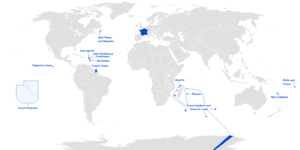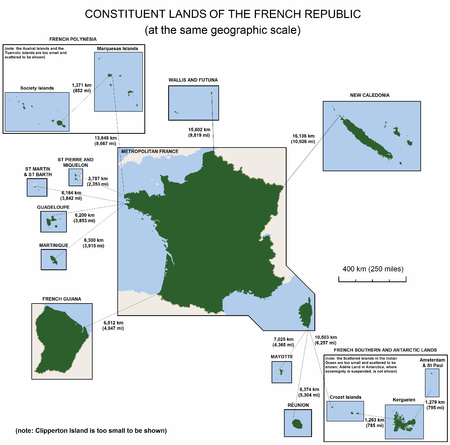French overseas departments and territories
Overseas France |
||||
|---|---|---|---|---|
|
||||
 |
||||
 |
||||
| Largest settlements | Nouméa, New Caledonia Papeete, French Polynesia | |||
| Languages | French, Antillean Creole, Guianese Creole, Reunionese Creole, Shimaore, Tahitian, Marquesan, 'Uvean, Futunan, Drehu, Nengone, Paicî, Ajië, Xârâcùù, and 35 other native languages of New Caledonia | |||
| Demonym | French | |||
| Territories | ||||
| Leaders | ||||
| • | President | François Hollande | ||
| • | Ministry | George Pau-Langevin | ||
| Area | ||||
| • | Total | 551,394 km2 212,894 sq mi |
||
| Population | ||||
| • | estimate | 2,718,000 (2016) | ||
| Currency | Euro CFP Franc |
|||
| Date format | dd/mm/yyyy (AD) | |||
The French overseas departments and territories (French: départements et territoires d'outre-mer, colloquially referred to as the DOM-TOM [dɔmtɔm][1]) or Overseas France (French: France d'outre-mer) consist of all the French-administered territories outside of the European continent. These territories have varying legal status and different levels of autonomy, although all (except those with no permanent inhabitants) have representation in both France's National Assembly and Senate, which together make up the French Parliament. Their citizens have French nationality and vote for the president of France. They have the right to vote in elections to the European Parliament (French citizens living overseas currently vote in the Overseas constituency). The Overseas France include island territories in the Atlantic, Pacific and Indian oceans, French Guiana on the South American continent, and several Periantarctic Islands as well as a claim in Antarctica.
From a legal and administrative standpoint, overseas regions are very different from overseas collectivities. Overseas regions have exactly the same status as mainland France's regions. The French constitution provides that, in general, French laws and regulations (France's civil code, penal code, administrative law, social laws, tax laws, etc.) apply to French overseas regions the same as in mainland France, but can be adapted as needed to suit the region's particular needs. In the French overseas regions, laws cannot be adapted whereas the overseas collectivities are empowered to make their own laws, except in certain areas (such as defense, international relations, trade and currency, and judicial and administrative law). The overseas collectivities are governed by local elected assemblies and by the French Parliament and French government (where a cabinet member, the Minister of Overseas France, is in charge of issues related to the overseas territories).
The Overseas France has an exclusive economic zone (EEZ) of 9,821,231 km² (3,791,998 sq. miles),[2] and account for 17.8% of the land territory and 96.7% of the EEZ of the French Republic (excluding the district of Adélie Land, part of the French Southern and Antarctic Territories, where the French sovereignty is effective de jure by French law, but where the French exclusive claim on this part of Antarctica is frozen by a mandatory international cooperation since the signing of the Antarctic Treaty in 1959).
Varying constitutional statuses
Overseas regions
- Guadeloupe (since 1946)
- French Guiana (since 1946)
- Martinique (since 1946)
- Réunion (since 1946)
- Mayotte (since 2011) 1976–2003: sui generis overseas territory; 2001–2003: with the designation departmental community; 2003–2011: Overseas community. In the 2009 Mahoran status referendum, Mahorans voted to become an overseas department in 2011, which occurred on March 31, 2011.
Overseas collectivities
The category of "overseas collectivity" was created by France's constitutional reform of March 28, 2003. Each overseas collectivity has its own statutory laws.
- French Polynesia (1946–2003: overseas territory, since 2003: overseas collectivity) In 2004 it was given the designation of "overseas country" (French: pays d'outre-mer), but the Constitutional Council of France has clarified that this designation did not create a new political category.
- Saint Pierre and Miquelon (1976–85: overseas department, 1985–2003: sui generis overseas territory, since 2003: overseas collectivity). Despite being given the political status of "overseas collectivity," Saint Pierre et Miquelon is called collectivité territoriale de Saint-Pierre-et-Miquelon, literally "territorial collectivity."
- Wallis and Futuna (1961–2003: overseas territory, since 2003: overseas collectivity). It is still commonly referred to as a territoire (Territoire des îles Wallis et Futuna).
- Saint Martin: In 2003, the populations of St. Martin and St. Barthélemy voted in favour of secession from Guadeloupe in order to become separate overseas collectivities of France.[3] On February 7, 2007, the French Parliament passed a bill granting COM status to both jurisdictions.[4] The new status took effect on February 22, 2007 when the law was published in the Journal Officiel.[5] They remain part of the European Union, as stated in the Treaty of Lisbon.[6]
- Saint Barthélemy (see the comments immediately above).
Overseas territories
- French Southern and Antarctic Lands (Terres Australes et Antarctiques Françaises; overseas territory of France since 1956). It is currently the only overseas territory. According to law 2007-224 of February 21, 2007, the Scattered Islands in the Indian Ocean constitute the 5th district of TAAF.
Special status
- New Caledonia was classified as an overseas territory beginning in 1946, but as a result of the 1998 Nouméa Accord, it gained a special status (statut particulier or statut original) in 1999. A New Caledonian citizenship was established (in addition to the French citizenship which is kept in parallel, along with the consequent European citizenship), and a gradual transfer of power from the French state to New Caledonia itself was begun, to last from 15 to 20 years.[7]
- Clipperton Island (French: Île de Clipperton or Île de la Passion, Spanish: Isla de la Pasión) is a 9 km2 (3.5 sq mi) coral atoll located 1,280 km (800 miles) south-west of Acapulco, Mexico, in the Pacific Ocean. It is held as state private property under the direct authority of the French government, and is administered by France's Overseas Minister.
Political representation in the French Parliament

With 2,691,000 inhabitants in 2013, Overseas France account for 4.1% of the population of the French Republic.[8] They enjoy a corresponding representation in the two chambers of the French Parliament.
Representation in the National Assembly
In the 13th Legislature (2012-2017), Overseas France is represented by 27 députés (M.P.s) in the French National Assembly, accounting for 4.7% of the 577 députés in the National Assembly:
- Réunion: 7 députés
- Guadeloupe: 4 députés
- Martinique: 4 députés
- French Polynesia: 3 députés
- French Guiana: 2 députés
- Mayotte: 2 député
- New Caledonia: 2 députés
- Saint Pierre and Miquelon: 1 député
- Wallis and Futuna: 1 député
- Saint Barthélemy and Saint Martin: 1 député
Representation in the Senate
Since September 2011, Overseas France is represented by 21 senators in the French Senate, accounting for 6.0% of the 343 senators in the Senate:
- Réunion: 4 senators
- Guadeloupe: 3 senators
- French Guiana: 2 senators
- French Polynesia: 2 senators
- Martinique: 2 senators
- Mayotte: 2 senators
- New Caledonia: 2 senators
- Saint Barthélemy: 1 senator
- Saint Martin: 1 senator
- Saint Pierre and Miquelon: 1 senator
- Wallis and Futuna: 1 senator
List of French overseas territories
Inhabited departments and collectivities
The 11 French overseas territories are :
| Flag[note 1] | Name | Capital | Population | Land area (km2) | Population density (inh. per km2) | Status | Location | Notes |
|---|---|---|---|---|---|---|---|---|
| |
French Guiana | Cayenne | 250,109 (Jan. 2013)[9] | 83,534[10] | 3 | Overseas department / region | South America | |
| |
French Polynesia | Papeete | 268,270 (Aug. 2012)[11] | 3,521[12] | 76 | Overseas collectivity | South Pacific Ocean | |
| |
Guadeloupe | Basse-Terre | 405,739 (Jan. 2013)[9] | 1,628[10] | 249 | Overseas department / region | Antilles | |
| |
Martinique | Fort-de-France | 386,486 (Jan. 2013)[9] | 1,128[10] | 343 | Overseas department / region | Antilles | |
| |
Mayotte | Mamoudzou | 226,915 (Jan. 2015)[13] | 374[12] | 569 | Overseas department / region | Africa (Mozambique Channel) |
Voted on March 29, 2009 in favour of attaining overseas department / region status. That status became effective on March 31, 2011. Also claimed by Comoros |
| |
New Caledonia | Nouméa | 268,767 (Aug. 2014)[14] | 18,575.5[15] | 14 | Sui generis collectivity | South Pacific Ocean | Referendum for independence to occur sometime during the period of 2015 to 2019. |
| |
Réunion | Saint-Denis | 840,974 (Jan. 2013)[9] | 2,504[10] | 336 | Overseas department / region | Africa (Indian Ocean) |
|
| |
Saint Barthélemy | Gustavia | 9,035 (Jan. 2011)[16] | 25[17] | 361 | Overseas collectivity | Antilles | Detached from Guadeloupe on February 22, 2007. |
| |
Saint Martin | Marigot | 36,286 (Jan. 2011)[16] | 53[18] | 685 | Overseas collectivity | Antilles | Detached from Guadeloupe on February 22, 2007. |
| |
Saint Pierre and Miquelon | Saint-Pierre | 6,080 (Jan. 2011)[16] | 242[12] | 25 | Overseas collectivity | Southeast of Canada | |
| |
Wallis and Futuna | Mata-Utu | 12,197 (Jul. 2013)[19] | 142[12] | 86 | Overseas collectivity | South Pacific Ocean | |
- ↑ Article 2 of the French Constitution states that the French flag is the only legal flag of France. Only French Polynesia, a collectivity, and New Caledonia, a special collectivity are allowed official flags. This right was granted to French Polynesia by a September, 6th, 1984, law and to New Caledonia by the Nouméa Accord. The Administrator of French Antarctica is also granted his own flag through a February, 23rd, 2007 ordinance. Historical flags are sometimes used but have no basis in law. Many territories use unofficial flags to represent the territories. The unofficial flags are shown below.
Uninhabited overseas territories
(Lands generally uninhabited, except by researchers in scientific stations)
| Flag | Name | District | Scattered islands | Capital | Land area (km2) | Status | Location | Notes |
|---|---|---|---|---|---|---|---|---|
| Clipperton | - | - | - | 2[20] | French state private property | West of Mexico | ||
| |
French Southern and Antarctic Lands | Crozet Islands | - | Alfred Faure | 340[21] | TAAF district | South Indian Ocean | |
| Kerguelen Islands | - | Port-aux-Français | 7,215[21] | TAAF district | South Indian Ocean | |||
| Saint-Paul Island and Amsterdam Island |
- | Martin-de-Viviès | 66[21] | TAAF district | Indian Ocean | |||
| Adélie Land | - | Dumont d'Urville Station | 432,000[21] | TAAF district | Antarctica | Under terms of Antarctic Treaty System | ||
| Scattered Islands in the Indian Ocean | Banc du Geyser | - | 0 | TAAF district | Africa (Mozambique Channel) |
Claimed by Madagascar and Comoros | ||
| Bassas da India | - | 1[21] | TAAF district | Africa (Mozambique Channel) |
Claimed by Madagascar | |||
| Europa | - | 30[21] | TAAF district | Africa (Mozambique Channel) |
Claimed by Madagascar | |||
| Glorioso Islands | - | 7[21] | TAAF district | Indian Ocean | Claimed by Comoros, Madagascar and Seychelles | |||
| Juan de Nova | - | 5[21] | TAAF district | Africa (Mozambique Channel) |
Claimed by Madagascar | |||
| Tromelin Island | - | 1[21] | TAAF district | Indian Ocean | Claimed by Mauritius |
Largest cities in overseas France
|
This article is part of the series on
Administrative divisions of France |
|
(incl. overseas regions) |
|
(incl. overseas departments) |
|
Urban communities |
|
Others in Overseas France
Overseas collectivities |
Ranked by population in the urban area:
- Pointe-à-Pitre–Les Abymes (Guadeloupe): 315,684 inhabitants (in 2013)
- Saint-Denis (Réunion): 197,256 (in 2013)
- Fort-de-France (Martinique): 171,628 (in 2008)
- Nouméa (New Caledonia): 163,723 (in 2009)
- Saint-Pierre (Réunion): 148,273 (in 2008)
- Papeete (French Polynesia): 131,695 (in 2007)
- Saint-Paul (Réunion): 103,008 (in 2008)
- Cayenne (French Guiana): 102,089 (in 2008)
See also
- French colonial empire
- Administrative divisions of France
- Government of France
- List of islands administered by France in the Indian and Pacific oceans
- Communes in France
- Outremer
- Metropolitan France
- Organisation internationale de la Francophonie
- List of French possessions and colonies
References
- ↑ About.com, Definition of les DOM-TOM
- ↑ The Pew Charitable Trusts. "SEA AROUND US PROJECT: Exclusive Economic Zones (EEZ)". Archived from the original on January 2, 2014. Retrieved January 31, 2014.
- ↑ "French Caribbean voters reject change". Caribbean Net News. December 9, 2003. Retrieved February 9, 2007.
However, voters in the two tiny French dependencies of Saint-Barthélemy and Saint-Martin, which have been administratively attached to Guadeloupe, approved the referendum and are set to acquire the new status of "overseas collectivity".
- ↑ Magras, Bruno (February 16, 2007). "Letter of Information from the Mayor to the residents and non-residents, to the French and to the foreigners, of Saint Barthelemy" (PDF). St. Barth Weekly. p. 2. Retrieved February 18, 2007.
On February 7 of this year, the French Parliament adopted the law granting Saint-Barthélemy the Statute of an Overseas Collectivity.
- ↑ "Saint-Barth To Become An Overseas Collectivity" (PDF). St. Barth Weekly. February 9, 2007. p. 2. Retrieved February 9, 2007.
- ↑ "Treaty of Lisbon, Article 2, points 287 and 293". Retrieved January 31, 2008.
- ↑ "Nouvelle-Calédonie", Le Petit Larousse (2010), Paris, page 1559.
- ↑ Population of Metropolitan France and the 4 old overseas departments (), plus the new overseas department of Mayotte (), plus the overseas collectivities of French Polynesia (), New Caledonia (), Wallis and Futuna (), and St Martin, St Barth, and St Pierre and Miquelon ().
- 1 2 3 4 INSEE. "Estimation de population au 1er janvier, par région, sexe et grande classe d'âge – Année 2013" (in French). Retrieved January 26, 2014.
- 1 2 3 4 INSEE. "Base chiffres clés : évolution et structure de la population 2010" (in French). Retrieved January 31, 2014.
- ↑ ISPF. "Population des subdivisions administratives de Polynésie française" (in French). Retrieved October 26, 2013.
- 1 2 3 4 INSEE. "Tableau Économique de Mayotte 2010" (PDF) (in French). p. 21. Retrieved January 31, 2014.
- ↑ INSEE. "212 600 habitants à Mayotte en 2012 - La population augmente toujours fortement" (in French). Retrieved October 26, 2013.
- ↑ ISEE. "Chiffres clés Nouvelle-Calédonie - Démographie" (in French). Retrieved October 26, 2013.
- ↑ ISEE. "Tableaux de l'Economie Calédonienne : Population, superficie et densité par commune et province en 2009" (PDF) (in French). Retrieved January 31, 2014.
- 1 2 3 INSEE, Government of France. "Populations légales 2011 des collectivités d'outre-mer" (in French). Retrieved January 31, 2014.
- ↑ INSEE. "Actualités : 2008, An 1 de la collectivité de Saint-Barthélemy" (in French). Retrieved January 31, 2014.
- ↑ INSEE. "Actualités : 2008, An 1 de la collectivité de Saint-Martin" (in French). Retrieved January 31, 2014.
- ↑ STSEE. "Populations légales au recensement de la population 2013 de Wallis et Futuna" (in French). Retrieved January 31, 2014.
- ↑ Ministry of Overseas France. "L'île de Clipperton" (in French). Retrieved January 31, 2014.
- 1 2 3 4 5 6 7 8 9 Délégation générale à l'outre-mer. "Terres Australes et Antarctiques Françaises : Données géographiques et humaines" (PDF) (in French). Retrieved January 31, 2014.
Further reading
- Robert Aldrich and John Connell, France's Overseas Frontier, Cambridge University Press, 1992
- Frédéric Monera, L'idée de République et la jurisprudence du Conseil constitutionnel - Paris : L.G.D.J., 2004 ;
